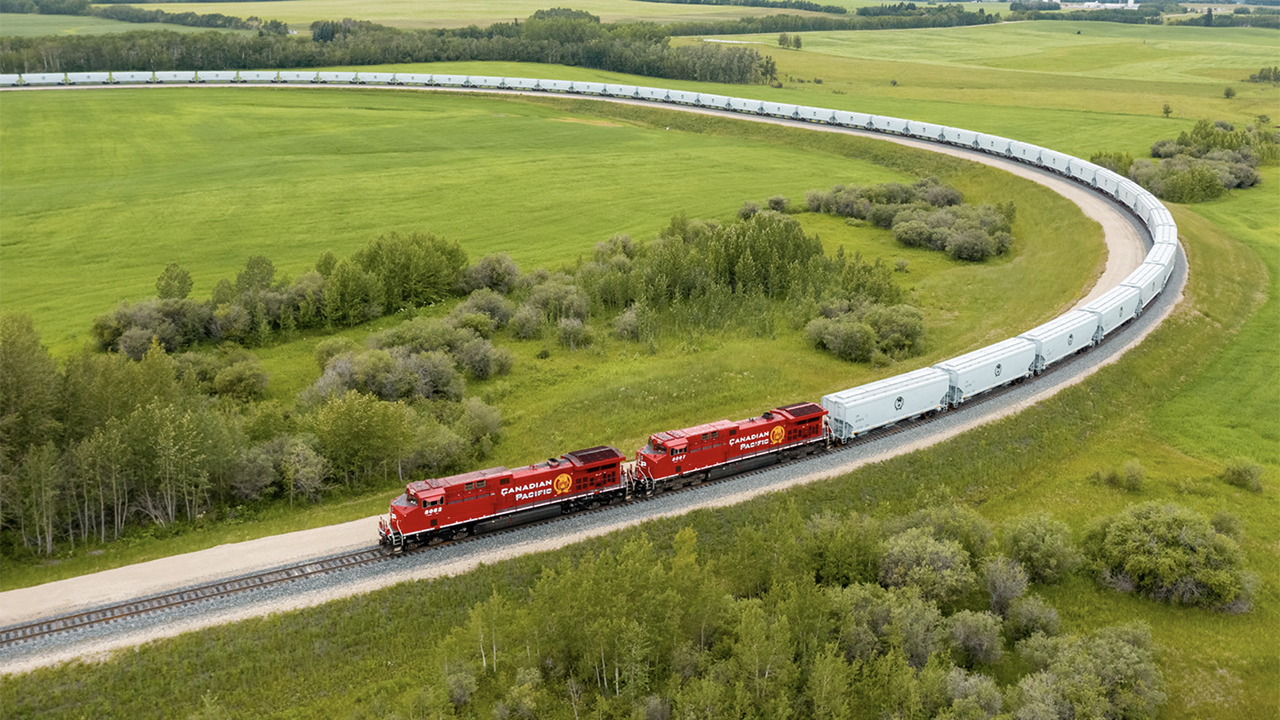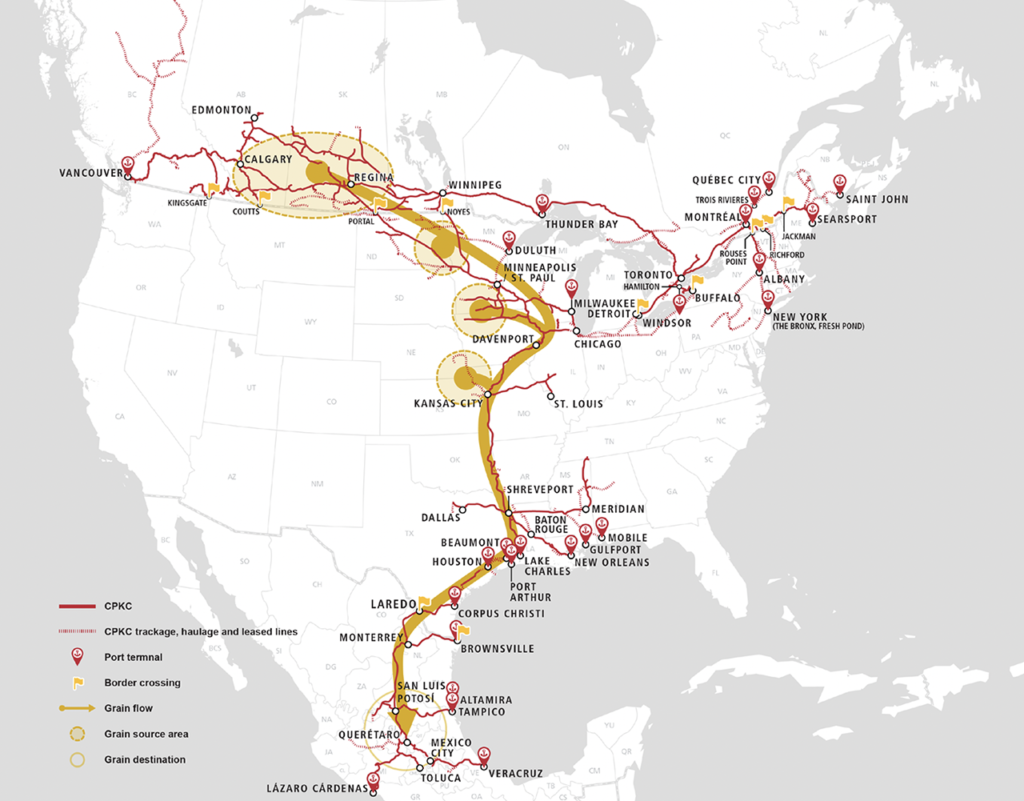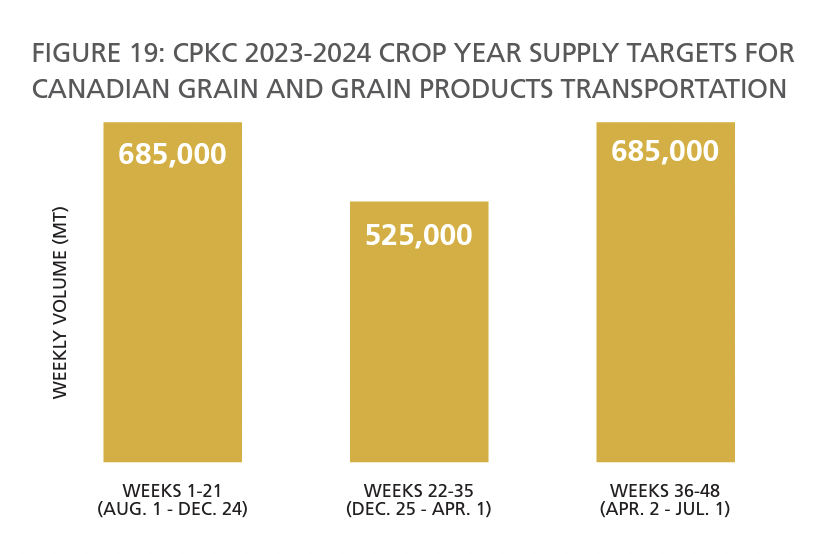
CPKC Issues 2023-24 Grain Service Outlook Report
Written by Marybeth Luczak, Executive Editor
“As we look toward the upcoming 2023-2024 crop year, CPKC is once again well prepared to move Canada’s grain crop to market, just as we have throughout our 142-year history,” said Keith Creel, CPKC President and CEO. “We have the capacity and the team to deliver for our grain customers and the Canadian economy during the upcoming crop year.” (CPKC Photograph)
Canadian Pacific Kansas City (CPKC) on July 31 published its Grain Service Outlook Report, as required by section 151.01(1) of the Canada Transportation Act. It provides an assessment of the newly merged Class I’s ability to move grain during the 2023-24 crop year, taking into account the total volume of grain expected to be hauled.

This is sixth-annual grain report for Canadian Pacific (CP) and the first for CPKC, which on April 14, 2023 merged CP with Kansas City Southern (KCS) to form a single-line, transnational railway connecting Canada, the U.S. and Mexico. It includes seven parts: an overview of the CPKC network’s benefits for grain customers; CPKC’s hiring and capital investment plans; a review of the 2022-23 crop year, including what CPKC called its “strong performance transporting Canada’s grain and grain products to ports for export, and the significant capacity that was unused by our grain customers”; an overview of the 2023-24 crop year, including customer expectations for grain crop size and CPKC’s plans to supply the rail capacity required to transport the crop; an overview of factors that “negatively impact” Canada’s grain supply chain capacity and reliability; CPKC’s technology deployment; and CPKC’s commitment to sustainability.
Among the highlights of the 2023-24 report:
- CPKC’s new combined rail network “brings unrivaled geographical reach to additional North American ports on the Atlantic, Pacific and Gulf coasts,” according to the railroad. “This provides Canada’s grain shippers faster access to markets across North America, including many new markets in Mexico, and enhanced routing optionality for transporting Canadian grain and grain products to overseas markets.”
- “Although it is still early in the season, our grain customers currently expect the size of the 2023-24 Western Canada crop to be consistent with last year,” reported CPKC, which noted that Statistics Canada currently forecasts this year’s total crop size at approximately 95.7 Million Metric Tons (MMT) and Western Canadian grain production at approximately 73 MMT. Dry conditions across the west, however, “are raising concerns within the industry that yields may be negatively affected,” CPKC said. “Customers are currently estimating Western Canadian crop yields in the range of 60 to 70 MMT.”

- Based on current customer forecasts, and subject to demand, CPKC said it plans to supply the capacity required to move 685,000 MT per week when the Port of Thunder Bay is open (generally from August through mid-December, and from April to July). During the winter months when the Port of Thunder Bay is closed, the railroad said it plans to supply the capacity required to move 525,000 MT of Canadian grain and grain products each week, subject to market demand. Given these weekly targets the railroad is slated to supply the capacity required to transport more than 33 MMT of Canadian grain and grain products throughout the crop year, subject to market demand. “This performance target is contingent on all elements of the supply chain, including grain customer terminals, ports and vessels, operating with maximum efficiency, reliability, predictability and balance throughout the duration of the crop year,” CPKC reported. “The railway is only one part of a complex, integrated grain supply chain. The supply chain is only as strong as its weakest link. Maximizing capacity and volume throughput requires all elements of the supply chain to operate with coordination, synchronization, efficiency and balance.”
- “Strike activity in July 2023 by the International Longshore and Warehouse Union (ILWU) at port terminals across British Columbia, including at Port of Vancouver, may impact fall grain transportation,” CPKC reported. “The federal government allowed the strike activity to continue for weeks, as supply chain capacity was lost through Canada’s pacific trade gateway. This lengthy shut down of most port terminals in B.C. caused significant disruption to North American supply chains. The duration of the strike means that supply chain recovery will stretch into 2024, potentially impacting grain transportation.”
- Throughout the 2022-23 crop year, there was “significant demand volatility” for Canadian grain and grain products, according CPKC. “We began the crop year with historically low demand followed by a rapid surge generated by a harvest that came earlier than forecasted by grain customers,” the railroad said. “In response to the early demand surge, CPKC rapidly ramped up capacity, moving an all-time monthly record of 3.14 MMT of grain products in October. We also set a record for the month of January, moving 2.29 MMT of grain products. Weekly records were achieved for weeks 19, 24, 28 and 29.” According to CPKC, demand for grain transportation “fell dramatically in Week 36 (beginning of April), dropping well below customer forecasts and the capacity we had resourced on the railway. Grain transportation demand remained low for the balance of the crop year, even though a significant volume of grain remained in storage on the prairies. This resulted in more than 5 MMT of unused capacity for Canadian grain transportation on the CPKC rail network over the course of the 2022-23 crop year, relative to our supply targets.”
- CPKC reported completing its more than $500 million investment to purchase 5,900 new higher-capacity grain hopper cars, which were built in Hamilton, Ontario. It said it has also leased an additional 1,490 higher-capacity hopper cars. Combined with the legacy KCS high-capacity fleet, CPKC has approximately 18,000 “modern” hopper cars in service.
- Looking ahead to the upcoming crop year, several factors “threaten to undermine the capacity of Canada’s grain supply chain,” CPKC reported. One is the “federal government’s policy decisions to resurrect extended interswitching.” In the report, CPKC President and CEO Keith Creel (Railway Age’s 2021 Railroader of the Year and, with his counterpart at Kansas City Southern, 2022 co-honoree) wrote: “Diversion of traffic from Canadian to U.S. rail carriers was the most significant consequence when this policy was tried previously from 2014 to 2017. Extended interswitching lowers the traffic density on Canadian railway networks that enables investment in capacity-enhancing infrastructure, resulting in investment dollars and jobs moving south of the border. Extended interswitching is unquestionably harmful to the interests of Canadian shippers, especially those in the agriculture sector, Canadian consumers, and the Canadian economy. It is fundamentally inconsistent with the goals of building capacity and maximizing volume throughput in the Canadian grain supply chain.” Other concerns: the federal government’s “commitment to introduce a prohibition on the use of replacement workers during strikes or lockouts,” which CPKC said would “create risks for Canada’s supply chains,” and the “continued challenge of loading grain onto vessels during periods of rain or snow in Vancouver,” which “must be resolved to maximize capacity and reliability.” According to Creel, delays in grain loading in Vancouver cause “significant ripple effects throughout the supply chain, backing up trains and interrupting the smooth, efficient, balanced cycling of railcars from in-country elevators to the port, and back.” The government of Canada, along with the grain terminal operators, unions and other stakeholders, he said, “must resolve this constraint, as grain terminals at other ports have, to safely maximize Canada’s ability to export grain to international markets, especially during the winter months when rain and snow are frequent in the Vancouver region. This is a major constraint on Canada’s ability to export more grain to the world.”
Despite these “avoidable headwinds,” CPKC concluded that it has “the capacity and the team to deliver for grain customers during the 2023-24 crop year.”



